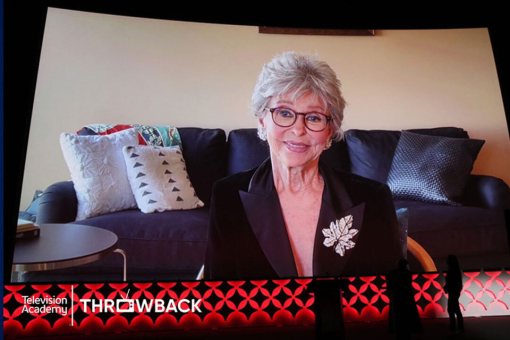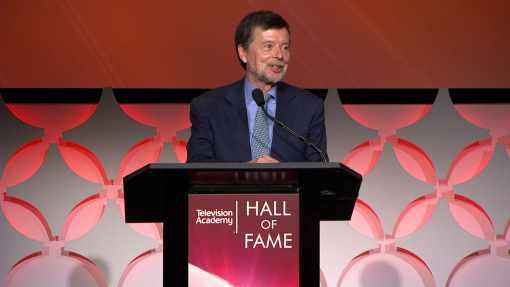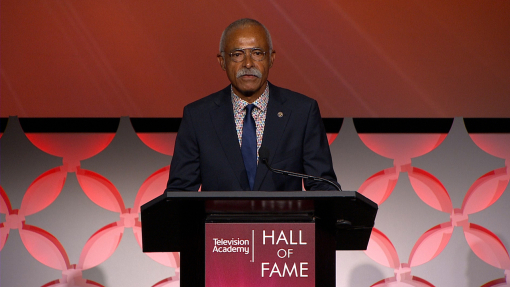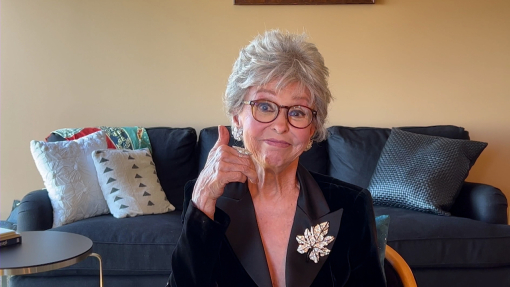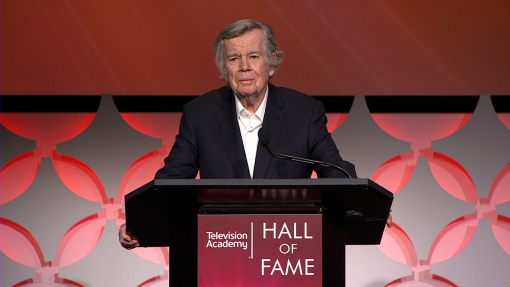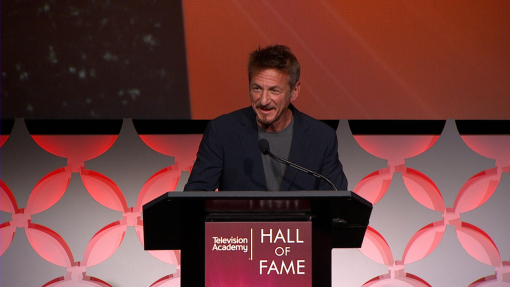“The best histories don’t soothe; they stir.”
Peter Jennings, a high school dropout from Canada who became one of the most recognized and respected broadcast journalists in the world, penned those words with co-author Todd Brewster in the bestseller, The Century — a companion book to ABC’s 1999 critically acclaimed 12-hour series. Today, they stand as a footnote to Jennings’ history. Best remembered as ABC’s foreign correspondent, anchor and senior editor of World News Tonight, Jennings honed his craft as a master storyteller and reporter bent on a mission — to seek the truth in everything, then seek more.
He stirred his audience with stories from an outsider perspective. His widow, Kayce Freed Jennings, former ABC producer and co-founder of The Documentary Group, says the self-educated Jennings saw himself that way, whether he was posted in Lebanon, Bosnia, England or on the anchor desk in New York.
“He’d grown up in Canada and spent the majority of his adult life living overseas. So, in fact, he was an outsider. I think he thought that was a great advantage in many ways … there was a freshness in the way he approached news,” she says. “He had this intense curiosity about everything. He was without a doubt the best learner I’ve every known, which made him such fun to be with. We walked home from work together several times a week. Every time we would learn something new because Peter would see something and ask about it, or stop to talk to a doorman, a construction worker or sanitation man and discover something he hadn’t known a few minutes earlier.”
Above all, Jennings hated conventional wisdom and saw it as intellectual laziness. “He didn’t understand why people — particularly other journalists — would so easily buy into it. He wasn’t cynical. He could be skeptical but that, again, was about challenging conventional wisdom, or pushing back against the easy answers.”
Example: During the run-up to the Iraq War, Jennings interviewed General Tommy Franks, the commander of the United States Central Command, and asked what other journalists were asking: “Do you have enough troops to win the war?” Then, “he asked the question others weren’t asking: ‘Do you have enough to win the peace?’ The follow-up question was as important as the first,” she says. “That kind of approach is what made Peter different. He came under a lot of fire for asking that second question — he was attacked for being unpatriotic. Of course, it’s now pretty clear that it was exactly the question that needed to be asked.”
When two hijacked airplanes struck New York City’s World Trade Center towers on Sept. 11, 2001, Jennings was a comforting and knowledgeable voice in the anchor chair. “It’s hard to find a finer hour for Peter,” says former ABC News President David Westin. “He proved to be one of the best breaking news anchors in history. He knew so much about foreign affairs, terrorism and had interviewed Osama Bin Laden.” Jennings’ hallmark was “his steadiness,” says World News executive producer Jon Banner. “As voices got louder, he got quieter. To all of our benefit, I think everything he did as a journalist … he spent his life building for that day.”
Jennings logged more than 60 hours on air that day and in the ones that immediately followed. Critics heralded his effort as a tour de force of interviewing and explanatory broadcast journalism.
On April 5, 2005, he anchored the evening news for the last time. His final story: himself. Jennings, 67, had lung cancer, a cruel irony to a former smoker who had questioned the power of the big tobacco companies. He died four months later, ending the superstar era of the Big Three — anchors Tom Brokaw of NBC and Dan Rather of CBS, both retired earlier that year. Jennings’ broadcast had an eight-year ratings winning streak that hit its peak in the 1992-1993 television season, drawing an average of 14 million viewers a night. It eventually yielded to NBC, crippled further by competition from cable news and the internet. For two decades the trio of highly paid, white male, globetrotting anchors dominated the evening news.
As the New York Times wrote: the anchors “logged so many miles over so many years in so many trench coats and flak jackets that they effectively acted as bookends on some of the biggest running stories of modern times.”
Jennings’ big adventures began in 1968. Although he joined ABC News August 3, 1964, and became anchor of the short-lived Peter Jennings with the News from 1965 to 1967, poor ratings and inexperience took a toll. Rather met Jennings in Saigon in 1965. “I asked him if he was assigned to the bureau and he looked a little sheepish. He said, ‘I’m not going to be here long enough.’ He was hauled there for a photo shoot” to promote his anchor announcement. Two years later the anchor job was over. His formidable rival, CBS anchor Walter Cronkite, once said: “There was a lot of criticism about ABC taking on this young Canadian telling the news of America.”
For Jennings, failure was unacceptable; as the son of Canada’s pioneer of radio news, Charles Jennings, the Edward R. Murrow of the Canadian Broadcasting Corporation, Jennings admired his father and wanted to follow in his footsteps.
At age nine he was hosting his own radio show in Canada, Peter’s People; by twenty-four, he was named co-anchor of the late-night newscast on CTV, Canada’s first private television network. By the age of 30, he was at a professional crossroads. “Peter sucked it up and transformed himself into a foreign correspondent,” notes Rather. After his failed attempt at anchoring, Jennings moved up through the ranks at ABC and became the bureau chief in Beirut, Lebanon, the first television news bureau in the Arab world. “Vietnam was the world-class story at the time but Peter went to the Middle East, concentrated on the region, studied intensely and made himself the ruling expert. He knew more and covered more than anybody,” Rather says.
It paid off. During the 1972 Munich Olympics, when terrorists took 11 Israeli athletes hostage and later killed them, Jennings’ coverage put ABC News on the map. “We were fierce competitors and friends,” Rather says. “And when anyone in this business was under attack … and I think I was half the time … Peter was there. He was terrific as a man. And to me, he was a constant champion and master of quality international coverage. Because of that he had a major impact on television news.”
As a foreign correspondent, Jennings covered the Berlin Wall going up in the 1960s, and as an anchor, reported on it coming down in the 1990s. He covered the birth of the Solidarity labor and political movement in Gdansk, Poland, as well as the overthrow of the country’s communist government. He covered the American civil rights movement in the South in the 1960s and the struggle for equality in South Africa in the 1970s and ’80s. From every European nation behind the Iron Curtain and the Soviet Union he reported on the repression and demise of communism. Tireless and intrepid, he reported from every war zone, major world capital, and from all 50 states.
He became sole anchor and senior editor of ABC’s World News in September 1983, a job he held for 22 years. He received every major prestigious broadcast award for his work, including his documentaries Peter Jennings Reporting. He kept them in his office bathroom next to the toilet — his exercise in humility. Among his critically acclaimed documentaries, The Search for Jesus followed by Jesus and Paul — The Word and the Witness, captivated millions. Jennings prodded ABC to hire the first network religion reporter.
When Good Morning America Weekend co-anchor Dan Harris started at ABC he was assigned to cover religion and the Middle East. “I’m an atheist,” Harris says. “He told me that to understand the world, you had to have a better understanding of how much peoples’ actions were motivated by faith. I now have a much higher sensitivity to and for the world’s religions and give him an enormous amount of credit. He was a great boss.”
Albeit a boss with peculiarities; Jennings would often shine his shoes “ten times a day,” says Tom Yellin, Jennings’ former executive producer at ABC News and co-founder of The Documentary Group. “He would do it when anyone came in his office. Whatever you were saying, it wasn’t that he wasn’t paying attention. You were just filling up 68 percent of his space and he was filling up the other 32 percent!”
Jennings adored his children, Elizabeth, 25, and Christopher, 23. He loved America, kept a copy of the Constitution in his back pocket, and when he became a naturalized citizen in 2003, he kept it private. He was interested in the Everyman and was a committed advocate for the homeless.
“He really did have a profound interest in everything, and that was part of his power as a journalist,” says Yellin. “He had this rare combination of living in the moment, 100 percent curiosity and the highest journalistic values.”
Jennings summed up his career aspirations in 1967, after his first try at being an anchor in America failed. “I want to reach the point where Walter Cronkite or his counterpart at that future date will say, ‘Peter Jennings is a good news correspondent. He is a good communicator. He is a good broadcaster. He is a good human being.’”
He was.
This tribute originally appeared in the Television Academy Hall of Fame program celebrating Peter Jennings's induction in 2011.

